Graham Reid | | 10 min read
The Jayhawks: Hide Your Colours
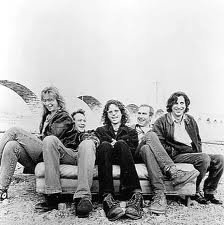
Whenever anyone speaks of the No Depression movement – the alt.country and roots music which emerged in the early Nineties -- one band's name is always mentioned: The Jayhawks.
Out of Minneapolis, the five-piece Jayhawks influenced bands such as Uncle Tupelo (which split to form Wilco and Son Volt) and their first two major label albums Hollywood Town Hall (1992) and Tomorrow the Green Grass in '95 (which followed two indie releases) are considered exemplars of the growing roots movement.
Based around songwriters Mark Olson and
Gary Louris, the Jayhawks looked to have a long career ahead of them
– but Olson quit to spend time with his wife Victoria Williams
(suffering from MS) and started a separate solo career and with the
band the Original Harmony Ridge Creekdippers.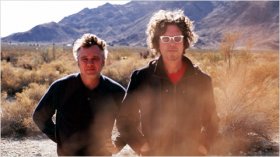 Louris (right in the photo, with Olson) steered the Jayhawks into a more
rock-oriented direction on the Sound of Lies and Smile but eventually
he pulled the plug in 2004 and embarked on a solo career.
Louris (right in the photo, with Olson) steered the Jayhawks into a more
rock-oriented direction on the Sound of Lies and Smile but eventually
he pulled the plug in 2004 and embarked on a solo career.
Despite their apparent musical differences, Louris and Olson recorded Ready for the Flood in 2008 and frequently toured together while maintaining separate recording and performing careers.
Given their long association, a Jayhawks reunion was almost inevitable. And it has arrived with the release of their album Mockingbird Time where their signature vocal harmonies and distinctive rootsy songs – strong on melody and acoustic guitars – are once again to the fore.
And you can also hear elements of
Louris' passion for classic British rock of the Sixties also.
But a Jayhawks album it is.
I guess you have just answered the
question which you have heard for the past decade or so, 'When is the
band getting back together?' But it seemed to me this has been long
prepared for. You worked with Gary on Ready for the Flood, there was
the Jayhawks' Anthology and the Legacy editions . . . This was a natural
process and coming back anyway.
Yeah ,we have been playing together for
almost 10 years now before we made this record, which is
unbelievable.
So the real question is, 'What took you
so long?'
You're not kidding. I think it was a
matter of everybody working on different things, but by doing Ready
for the Flood we went out and toured a lot with just two acoustic
guitars. Then we got the band back together in a sense to give people
what they wanted.
Because people know those records and a
lot of times they discovered them long after the band wan't playing
live anymore. So a lot of people know the songs because they seem to
have lasted, but have never seem the band live. So it was 'Let's go do some shows and
put out a new record' because we wanted them to have some current
material.
In that regard it must be gratifying
that when you play live this is an audience which is new and
enthusiastic, and not just the old audience.
Well we never had a huge audience. We
went over to Europe when we first made Hollywood Town Hall. Where we
really found our first audience was in Holland and then we played,
like, 12 times in London and so we worked hard in the UK. But we
didn't really bust out there.
But then in Spain . . . there was a
Spanish promoter who really broke the band in Spain. They were the
main places where we had a pretty sizable audience.
But in America we were always up
against the grunge thing during the time I was in the band. We had an
audience but it wasn't an over-the-top thing, you have to understand
that about the band.
See people like me who heard this music
back then and loved it and took it to heart think you were quite big
because we knew about you.
That was part of our drive. During the
time we were doing something different from the current musical trend
and that's good. If I was ever to be in band and start out down this
path again I would do exactly the same thing, try to do something
that was different.
I don't see it much fun to see which
way the wind is blowing and go with it, you've got to go up against
it. So we were doing harmony singing and melodic writing during a
time when things were a lot more aggressive.
So when we were touring in America we were
like the band doing warm-up shows, playing first a lot. But we had
committed fans. We were never a major musical movement along the
lines of a lot of other bands which were our contemporaries.
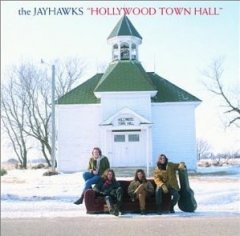 I guess by standing outside your time
it gives the music a timeless quality.
I guess by standing outside your time
it gives the music a timeless quality.
I hope so. That was the goal. We
listened to the Band, Bob Dylan, Neil Young, Nick Drake – all of
those people – when we were working on Hollywood Town Hall and
Tomorrow the Green Grass and of course we wanted to try to write
songs that were lasting.
To this day Stuck Inside of Mobile with
Memphis Blues Again and Mr Tambourine Man, when you hear those songs
they blow you out of the water, they touch so many people in
different ways. We were songwriters and our goal was to try and do
something like that. I don't know if we achieved that, but down the
road people still want to hear us play so we touched some of that.
What we did does go against the time to
some extent because things sound dated if you are too close to
production values and sound qualities of a specific time in music.
There is definitely a push-pull with the songwriter/musician and then
the technician side of music, the engineer and the studio and the
record companies.
You are part of a value of what drum
level and vocal levels should be, and they all have a place. But for
my money I think they had it right around the late Sixties/early Seventies as far as where the vocals and guitars and drums should
sit. A lot of the stuff which comes from the Eighties is strange to
listen to, they got off course. I don't think the musicians got off
course, but the production values did.
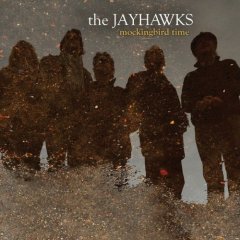 Let me turn attention to Mockingbird
Time. You and Gary were working out these songs in different
locations and I wonder how much those three different places informed
the writing. It might be obvious to say that Tiny Arrows would have
been written at your place in Joshua Tree, but also it might not have
been. How much does a sense of place feed into what you were writing?
Let me turn attention to Mockingbird
Time. You and Gary were working out these songs in different
locations and I wonder how much those three different places informed
the writing. It might be obvious to say that Tiny Arrows would have
been written at your place in Joshua Tree, but also it might not have
been. How much does a sense of place feed into what you were writing?
We got together first at Joshua Tree
then at Gary's apartment in Minneapolis and we went to my sister's
cabin, then we got together again in Joshua Tree. Some of the lyrics?
One of the songs for instance, Highwater Blues, I walked outside and
there actually was some strange bird cage siting in the yard. That
was a song we made up on the spot, started with the first line and
built on it from there. That happens on occasions.
But I do have to say that what happens
in a person's interior life is way more important, say over the span
of a year. When you sit down to write it is the span of a lifetime,
because you might write about your childhood or early relationships,
or going back to figure out some philosophy that has been going on in
your mind.
So a person's interior life is more
important than what is going on right around them, especially for
most musicians who tend to be introverted and lost in their own
thoughts most of the time. A lot of times it is a struggle when you
are involved in some creative process because you tend to get lost
upstairs, that's the only way to put it, to even notice what is going
on around you.
People say 'the absent-minded
professor'. That is a cliché but there is something to it. You are
thinking on things and for me it's like running down mathematical
equations of words and how to place words and replace words with
something different which lead to some thought-provoking idea.
Occasionally you get lucky and get a
good line, but I don't sit around looking for good lines. I consider
it a force of mathematical luck, because if you were to take into
account all the songs written and all the books written it is is hard
to write something totally new, so you go with your gut.
A song like Pouring Rain At Dawn has a
lovely pastoral feel but a song like that is the accumulation of many
previous thoughts and might not have been conceived in a pastoral
setting.
Totally, that's a fact. The interior
life is it when it comes to writing and music, so you can do it
anywhere. Really pretty settings aren't that good for writing anyway,
you are too involved with the pretty setting.
After you left the Jayhawks they went
in different direction with Gary with British pop coming in. And you
went in another direction with the Creekdippers and your solo work.
When it came to getting back together after a long time apart was
there a natural common ground that you two had and you could put
aside your personal interests or they became secondary to what the
Jayhawks meant?
The most influential thing about how we
brought back that sound was – yeah, we both have different
interests musically – but how we brought back the sound was we had
an idea and there people who liked certain qualities about the band
and we weren't going to go completely into left field with a new
Jayhawks record. We played live and saw what worked and that
influenced the direction of some of the songs on the record, to stick
in that mould the band had been in with harmonies, some mid-tempo
songs. The basic ideas were grounded in Hollywood Town Hall and
Tomorrow The Green Grass and they were really good albums.
We wanted to try to write an album that
would impress people on the level that was as good as those. We can
do the crazy left-field things on our own time.
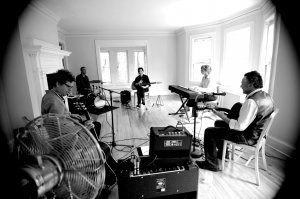 Coming back together was a natural
process and you find the common ground, but I understand because you
were going off on the back of a solo album that you had to record
these vocals quite quickly. Did that speed force you back into that
natural niche as well?
Coming back together was a natural
process and you find the common ground, but I understand because you
were going off on the back of a solo album that you had to record
these vocals quite quickly. Did that speed force you back into that
natural niche as well?
We did something different on the
vocals this time because of the time thing. We did drums and rhythm
instruments first and then Gary and I started to sing. We had all the
time we needed because we sang each song through five, six or seven
times. We hadn't finished every song fully or we wrote some bridges
in the studio so when it came time to sing we would do it with
acoustic guitars first, but we didn't have everything all mapped out.
So we worked on it right before the first take.
There is always an area within each
song as far as who is going to do what and where with the harmony
thing, and the matter of locking two voices in isn't that easy and you
have to really be listening to the other person. But we've done it a
lot so all that experience paid off.
I'm sure the time spend this time was
less than the two others I was involved in, but we had been just
playing so much longer and that experience counts for something. We
could just go at it like a puzzle and you always address that section
where it's not happening and take it from there.
You are now touring again as the
Jayhawks.
Yeah, we go to Spain and the UK and we
are doing festivals and club dates, then it's back to America.
The Spain thing happened just because
there was a promoter who was an enthusiast?
There was a promoter who took the band
around – I wasn't in it at that time – and he took them around
and presented them and I believe he put on a number of free concerts
and invested that much. So a lot of people saw the band and then
radio started playing the band and now there is a following
throughout the country.
Spain the best of anywhere. For us that
was the grassroots dream, that dream when you are young musician is
that there is still a grassroots, but it took someone who believed in
it.
It's like any band which makes it,
they have a manager or somebody who really believes in them and it
gives them a chance to be heard.


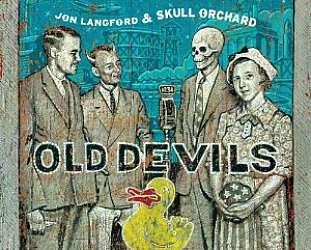
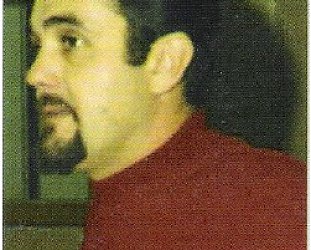
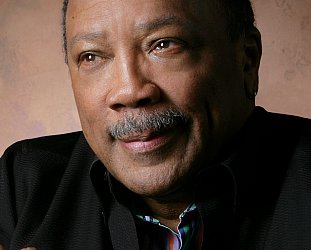


post a comment